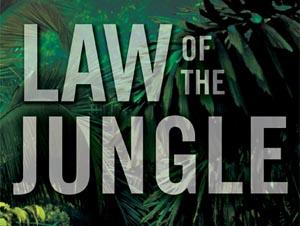‘Law of the Jungle’
This story is adapted from a broadcast audio segment; use audio player to listen to story in its entirety.
In 2008, three American contractors held captive for years in the Colombian jungle were rescued, along with politician Ingrid Bettencort, from leftist guerillas by Colombian soldiers. The story got a lot of attention, but less known is the tale of an earlier, but failed rescue mission. This story also involved Colombian soldiers out in the jungle, but they didn’t find the hostages, instead they found something else: a massive pile of buried cash.
The story is detailed in a new book by John Otis, called “Law of the Jungle: The Hunt for Colombian Guerrillas.”
How the soldiers stumbled on to the buried cash is remarkable, and it’s sure to be the opening scene if Otis ever wrote a screenplay based on the book.
It begins with the soldiers on the verge of mutiny after being in the jungle for countless days and running out of supplies.
“So they were killing monkeys and stewing monkeys over open fires and that was their food,” Otis explains. “So they were pretty angry and they were pretty much about ready to mutiny. That’s when one of these soldiers, from eating all this horrid Amazon chow, he had an upset stomach and he ran out into the bushes to relieve himself. And while he was out there, he stumbled upon all this money that had been buried by the guerillas.”
The stash came to about 20 million in Colombian pesos and US cash — more than any of these soldiers had seen in their lives.
“We’re talking about soldiers who were earning $44 a week, and they were on one of the most dangerous missions in one of the most risky areas of Colombia,” Otis says. “And they were also a little resentful because they were looking for these high paid US military contractor guys who were making six figures, and these Colombians, they were making 200 bucks a month.”
The buried money turned out to be the profits of drug trafficking and ransom payments made to FARC guerrillas, Columbian rebels heavily involved in the kidnapping trade. But to the soldiers, it was finders keepers.
So they stuffed their pockets, said Otis, and returned to the local gown where they blew their newfound wealth on whiskey, prostitutes and a few household items. “Some of them bought appliances and flat screen televisions, but the problem is they left a trail a mile wide and military MPs started to come after them almost immediately.”
Those who managed to escape to Ecuador and Panama weren’t heard from again. “One soldier got a sex change operation and opened up a string of beauty parlors in the city of Cali,” said Otis.
The soldiers who were rounded up by the MPs turned their money over. A total of 147 soldiers went on trial and were charged with stealing government property. They were convicted, but the conviction was later thrown out. Their troubles, however, were just beginning.
“Once they were free, they ended up in even greater danger because then the FARC guerrillas were angry that they had stolen the money from the guerillas, started to come out after them,” said Otis.
The FARC guerrillas assembled a special hit team to track down the soldiers, and killed to of hte solders.
“In another case that I detail in the book, one of the soldiers had used his money from the stash to buy his father a coffee farm,” said Otis. “The guerillas found out, they came after the soldier and couldn’t find him, so they kidnapped his father. Now the soldier felt so bad about getting his father into so much trouble, that the soldier went up into the hills to find the guerillas and he offered to trade himself for his father. So they freed his father, they took the soldier hostage and then ended up executing the soldier.”
While the tale of the soldiers is remarkable, uncovering buried money in the jungles of Columbia isn’t that uncommon, it turns out. According to Otis, FARC guerrillas earn an estimated 300 to 500 million dollars annually from drug trafficking and kidnapping people for ransom.
“They have stashes of cash all over the jungle because they can’t very easily open up high interest bank accounts in Bogota and other cities,” Otis explains. “They have to do something with all this cash and so they bury it in the jungle. So it’s actually a little bit more common than you think that people in Colombia find stashes of money.”
PRI’s “The World” is a one-hour, weekday radio news magazine offering a mix of news, features, interviews, and music from around the globe. “The World” is a co-production of the BBC World Service, PRI and WGBH Boston. More “The World.”
